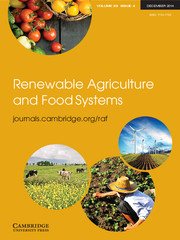Article contents
Factors affecting crop diversity in farmers' fields in Nepal
Published online by Cambridge University Press: 27 November 2013
Abstract
A study was conducted on the spatial dimension of crop diversity in Jutpani Village Development Committee (VDC) in central Nepal. Many crop diversity studies focus only on home gardens, but this study aimed to investigate the crop diversity among different production systems, and the factors affecting variations in the crop diversity on a household level. A survey of inter-household variation in cultivated crop diversity in different land-use types among 134 households indicates that 96 different types of annual crops, perennial crops and fruit trees are cultivated. Individual farms cultivated an average of 26 different crops, with this number ranging from 11 to 45. Crops were used as food by the households and, based on their adaptive characters, they were grown either in home gardens or in upland, Tandikhet and lowland. Research showed that home gardens have the highest crop diversity (a total of 78 different crops grown) compared to upland, Tandikhet and lowland. Statistical analysis to understand the factors affecting the variation in crop diversity in the household level showed that the total number of crops grown (crop diversity) on a farm is significantly higher (P<0.001) in the Indo-Aryan ethnic group compared to the Tibeto-Burman group. Farmers with three different production domains maintained higher (P<0.001) crop diversity compared to having only one or two production domains. Poor farmers with small land holdings were associated with higher crop diversity (P<0.001) compared to rich farmers with large land holdings. Therefore, planning for agrobiodiversity management should focus on the production systems, and social and economic settings within the farming community.
- Type
- Research Papers
- Information
- Copyright
- Copyright © Cambridge University Press 2013
References
- 7
- Cited by


